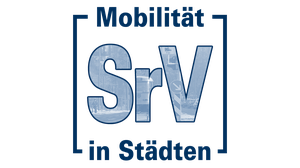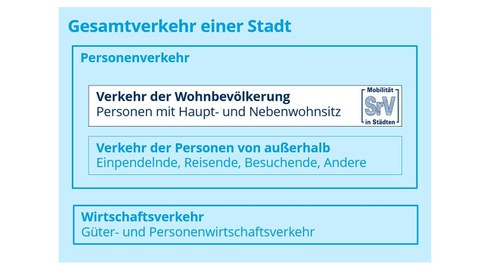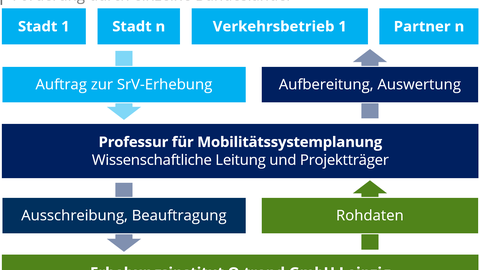Mobilität in Städten
Verkehr und Mobilität sind keine konstanten Größen. Das gilt erst recht für städtische Räume, wo demografische, infrastrukturelle, wirtschaftliche und viele andere Entwicklungen besonders eng ineinander greifen und planerische Spielräume unterschiedlich genutzt werden.
Die Dynamik, mit der sich gesellschaftliche und individuelle Randbedingungen infolge der Corona-Pandemie, der Auseinandersetzung mit dem Klimawandel und der aktuellen Energiepreisentwicklung ändern und auch auf das Verkehrssystem auswirken, ist erheblich. Gerade in diesen sehr bewegten Zeiten ist es wichtig, strategische Ausrichtungen auf den Prüfstand zu stellen und gegebenenfalls neu zu justieren. Hierzu braucht es zuverlässige Informationen und Daten.
Im Jahr 2028 findet der 13. Erhebungsdurchgang der Zeitreihe "Mobilität in Städten – SrV" statt. Diese einzigartige Zeitreihe war von Beginn an – als System repräsentativer Verkehrsbefragungen (SrV) – auf die Bedürfnisse der Planungspraxis zugeschnitten. Die Daten und Ergebnisse liefern für Mobilitätsplanung und Verkehrspolitik wichtige Indikatoren zum Stand der Verkehrsentwicklung. Zugleich werden differenzierte Planungsgrunddaten ausgewiesen, die auch für die Verkehrsmodellierung von großer Bedeutung sind.
50 Jahre Erhebungstradition
Die Verkehrswissenschaft an der Technischen Universität Dresden analysiert seit 50 Jahren die Entwicklung des Einwohnerverkehrs in Städten durch regelmäßige Haushaltsbefragungen. Die erste Erhebung im "System repräsentativer Verkehrsbefragungen" (SrV) fand im Jahr 1972 statt, weitere Erhebungen in den Jahren 1977, 1982 und 1987.
Mit den Erhebungen in den Jahren 1991, 1994 und 1998 wurde der Regelabstand der Erhebungsdurchgänge verkürzt, um die dynamischen Veränderungen im Osten Deutschlands, die auch die Mobilität in den Städten betrafen, adäquat abbilden zu können.
Seit 2003 finden die SrV-Befragungen wieder im Abstand von fünf Jahren statt. Im SrV-Durchgang 1998 nahm mit Frankfurt am Main erstmals eine Stadt aus dem alten Bundesgebiet teil. Seitdem hat sich dieser Teilnehmerkreis kontinuierlich erweitert. Im SrV 2018 lag fast die Hälfte aller Untersuchungsräume in diesem Teil Deutschlands.
Das SrV 2023 fand in etwa 500 Städten und Gemeinden in allen Teilen Deutschlands statt. Die Gesamtstichprobe umfasste mehr als 280.000 Personen umfassen.




